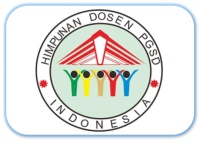Peningkatan Proses Pembelajaran Tematik Terpadu Menggunakan Model PBL di Kelas IV SD
Abstract
Keywords
References
Desyandri. (2016). Interpretasi Nilai-nilai Edukatif Lagu “Kambanglah Bungo” untuk Membangun Karakter Peserta Didik (Suatu Analisis Hermeneutik). Komposisi; Jurnal Pendidiikan Bahasa, Sastra, Dan Seni, 17(1), 37–53. Retrieved from http://ejournal.unp.ac.id/index.php/komposisi/article/view/7418/pdf
Desyandri, D., & Vernanda. (2017). Pengembangan Bahan Ajar Tematik Terpadu di Kelas V Sekolah Dasar Menggunakan Identifikasi Masalah. In Seminar Nasional HDPGSDI Wilayah 4 (pp. 163–174).
Desyandri, Muhammadi, Mansurdin, & Fahmi, R. (2019). Development of Integrated Thematic Teaching Material Used Discovery Learning Model in V Grade Elementary School. Jurnal Konseling Dan Pendidiikan, 7(1), 16–22. https://doi.org/https://doi.org/10.29210/129400
Faisal. (2014). Sukses Mengawal Kurikulum 2013 di SD. Yogyakarta: Diandra Creative.
Kemendikbud. (2014). Materi Pelatihan Guru Implementasi Kurikulum 2013. Jakarta: Badan Pengembangan Sumber Daya Manusia Pendidikan dan Kebudayaan dan Penjaminan Mutu Pendidikan Kementrian Pendidikan dan Kebudayaan. Jakarta: Kemdiknas.
Kemendikbud. Kurikulum 2013 Kompetensi Dasar Sekolah Dasar (Revisi). Jakarta: Kemendikbud.
Putra, Sitiatava Rizema. (2013). Desain Belajar Mengajar Kreatif Berbasis Sains. Jogjakarta: Diva Press.
Purwanto, Ngalim. (2013). Prinsip-prinsip dan Teknik Evaluasi Pengajaran. Bandung: Remaja Rosda Karya.
Raharjo, Heru. (2017). The Influence Of Problem-Based Learning And Direct Teaching On Students’ Learning Outcomes. Jurnal Pendidikan Teknologi dan Kejuruan. Vol. 24. ISSN:0854-4735.
Rusman.( 2015). Pembelajaran Tematik Terpadu : Teori, Praktik, dan Penilaian. Jakarta: Raja Grafindo Persada.
Suprihatiningrum, Jamil. (2016). Strategi Pembelajaran Teori dan Aplikasi. Jogjakarta: Ar-Ruzz Media.
Sugiyono. (2012). Metode Penelitian Pendidikan. Bandung: Alfabeta.
Indriawati, A., Susilowati, S.M.E., & Supardi, K.I. (2016). Pembelajaran Berbasis Masalah Dengan Bahan Ajar Berorientasi Sumber Daya Perairan Terhadap Karakter Peduli Lingkungan Dan Hasil Belajar IPA. Journal Of Primary Education. 5 (2), 104-112. ISSN 2502-4515.
DOI: http://dx.doi.org/10.24036/e-jipsd.v7i6.6605


